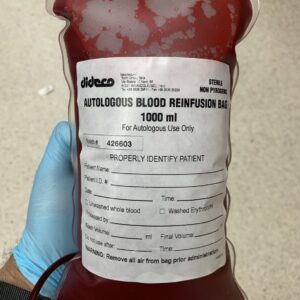There are four components in our blood.
Autologous Blood Donation:
Giving the Gift of Your Own Blood In the world of medical procedures, blood transfusions play a vital role in saving lives.
While allogeneic blood transfusions, where blood is donated by another compatible individual, are common, an increasing number of patients are opting for autologous blood donation.
This unique approach involves donating one’s own blood beforehand, which is then stored and used during a planned surgery.
What is Autologous Blood Donation?
Autologous blood donation, also known as auto-donation, is a medical procedure where an individual donates their own blood for future use.
This blood is typically collected weeks or even months before a planned surgery and carefully stored in a blood bank.
When the need for blood arises during the surgical procedure, the patient’s own previously donated blood is transfused back to them.
Why Choose Autologous Blood Donation?
* Reduced Risk of Transfusion Reactions: *
One of the primary advantages of autologous blood donation is the significantly reduced risk of transfusion reactions.
When receiving blood from another individual, there’s always a slight chance of incompatibility, leading to adverse reactions like fever, chills, and even life-threatening complications.
Autologous blood eliminates this risk entirely, as the patient receives their own blood.
* No Risk of Blood-borne Diseases: *
Autologous blood donation completely eliminates the risk of contracting blood-borne diseases such as HIV, hepatitis B, and hepatitis C, which can be transmitted through allogeneic transfusions.
* Peace of Mind: *
For many patients, knowing they have a readily available supply of their own blood can provide significant peace of mind before a scheduled surgery.
This is particularly important for patients with concerns about the safety of the blood supply or those with specific religious or personal beliefs that may prohibit the use of allogeneic blood.
The Autologous Blood Donation Process
The process of autologous blood donation typically involves the following steps:
* Medical Evaluation: *
Before any blood donation can proceed, a thorough medical evaluation is conducted to assess the patient’s overall health and determine their suitability for autologous donation.
This may include a physical examination, blood tests, and a review of medical history.
* Blood Collection: *
Blood is typically collected in multiple sessions, usually one or two units at a time, depending on the anticipated blood needs during surgery.
* Blood Storage: *
The collected blood is carefully processed and stored in a blood bank under controlled conditions to maintain its quality and viability.
* Blood Reinfusion: *
During the surgical procedure, the patient’s stored blood is carefully reinfused as needed.
Who is a Suitable Candidate for Autologous Blood Donation?
While autologous blood donation offers significant benefits, it’s not suitable for everyone.
Factors that may influence candidacy include:
* Type of Surgery:
Autologous blood donation is most commonly used for elective surgeries with predictable blood loss, such as orthopedic procedures, joint replacements, and some gynecological surgeries.
* Patient’s Health:
Individuals with certain medical conditions, such as anemia, infections, or those undergoing chemotherapy, may not be eligible for autologous donation.
* Time Frame:
Sufficient time is required to collect and store the necessary amount of blood before the scheduled surgery.
Potential Limitations of Autologous Blood Donation
* Limited Availability:
Autologous blood donation requires careful planning and may not be feasible for all surgical procedures, especially those that are emergent or unplanned.
* Storage Costs:
There may be associated costs involved in storing the donated blood.
* Risk of Iron Deficiency:
Repeated blood donation can potentially lead to iron deficiency, which may require iron supplementation.
The Role of Technology in Autologous Blood Donation
Advancements in technology have significantly improved the safety and efficiency of autologous blood donation.
* Blood Component Separation:
Modern techniques allow for the separation of specific blood components, such as red blood cells, platelets, and plasma, enabling more targeted and efficient utilization of the donated blood.
* Blood Storage Technology:
Improved blood storage methods, including refrigeration and specialized containers, help to maintain the quality and viability of stored blood for longer periods.
* Blood Inventory Management:
Sophisticated inventory management systems help to track and manage blood units efficiently, ensuring their availability when needed.
The Future of Autologous Blood Donation
As medical technology continues to evolve, we can expect further advancements in autologous blood donation.
* Point-of-Care Blood Processing:
Future technologies may enable the processing and reinfusion of blood at the point of care, reducing the need for extensive blood bank infrastructure.
* Regenerative Medicine:
Advancements in regenerative medicine may offer alternative approaches to blood transfusion, such as the regeneration of blood cells in the laboratory.
* Personalized Medicine:
A deeper understanding of individual patient needs and responses may lead to more personalized approaches to autologous blood donation, optimizing its safety and effectiveness.
Autologous blood donation represents a valuable option for patients undergoing planned surgeries.
By donating their own blood beforehand, patients can reduce the risk of transfusion reactions and blood-borne diseases, while also gaining peace of mind.
While not suitable for all patients or all surgical procedures, autologous blood donation offers a valuable alternative to allogeneic transfusions, contributing to safer and more personalized patient care.
Blood is not manufactured; it always comes from generous donors like you.
Do comment your views about this article and you can suggest us any new points about analogous blood donation.
Gaining knowledge is not about knowing everything about something; it is about knowing something about everything.



